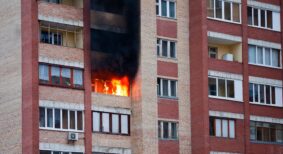A second Fire Code violation will push Ontario property owners, managers, corporate officers and directors into a steeper fine bracket under proposed amendments to the Fire Protection and Prevention Act. New legislation tucked into the 2019 Budget Measures Act introduces a distinct slate of penalties for “a subsequent offence” and clarifies that any conviction under the Act or its regulations will count as a first offence.
Fire departments will also have more time to prosecute infractions with the addition of a new section to authorize action within one year of implicating evidence coming to light. Until now, the Act has been silent on timelines for prosecution so fire officials have had to default to the parameters of the Provincial Offences Act, which gives them just six months from the time an incident occurs.
“That timing was extremely problematic for us,” says Jim Jessop, deputy chief with Toronto Fire Services. “These amendments will absolutely increase our ability to enforce the Ontario Fire Code and to deal with and mitigate other safety hazards not addressed in the Fire Code.”
For example, complicated investigations in the aftermath of a fire can take months to uncover all the contributing factors and related safety inadequacies. “Because of the timing, we were not able to move forward with dozens of prosecutions in cases where building owners had failed to comply,” Jessop advises.
The extended period for prosecutions, more stringent fines and additional flexibility for the province and municipalities to recover costs from property owners are set to come into force 30 days after the Ontario legislature adopts the Budget Measures Act, but there has been little formal communication of the government’s intentions. They were revealed in the final chapter of the provincial budget — entitled Details of Tax Measures — in a list with nine other planned legislative initiatives, and have received scant attention.
“We were not consulted,” reports Tony Irwin, president and chief executive officer of the Federation of Rental-housing Providers of Ontario (FRPO).
“Nobody has really picked up that this is in the works. Even our (life-safety) service providers weren’t really aware that this is happening,” concurs Randy Daiter, vice president, residential properties, with M&R Property Management. “There seems to be a growing trend to adopt an enforcement approach that’s geared toward generating revenue for government agencies.”
Subsequent offence category brings hefty cost hit
Monetary penalties will jump significantly for the new subsequent offence category. Notably, corporations are currently subject to fines of up $100,000 for contravening the Act or any of its regulations. That cap will rise to $500,000 for a first offence and to $1.5 million for a subsequent offence.
For individuals, conviction for any offence under the Act, not just those related to the Fire Code, will come with a first-time fine of up to $50,000. Subsequent offences will trigger fines of up to $100,000. The same increments apply for fines imposed on directors or officers of a corporation who are aware that the corporation has violated the Fire Code, or who knowingly commit an offence under the Act or any of its regulations.
This will match maximums already in place for offences under the Ontario Building Code Act. The Building Code Act further authorizes fines of up to $10,000 per day for a continuing offence when convicted parties fail to bring their buildings back into compliance with a chief building official’s order — a penalty that is not paralleled in the amendments to the Fire Protection and Prevention Act.
The current $2,000 maximum fine for tampering with or removing a posted notice from the Fire Marshal will take the most extreme upswing as it, too, will be pegged at $50,000 for a first offence and $100,000 for a subsequent offence. Fire departments can also begin to pass through costs when it is necessary to close properties considered an immediate threat to safety.
“In cases where the building owner is either unwilling or unable to comply with the Fire Code, we have the ability to request authority (from the Fire Marshal) to close the building. We get permission to literally go in and change the locks and close the building,” Jessop explains. “In the past, the costs of everything from staff time to locksmiths to erecting fencing to keep the public out were borne by the municipality, which we do not think is appropriate.”
Tenants and service providers play a role in compliance
The Fire Code’s oversight of existing buildings makes it a more common compliance challenge for landlords and their property managers than the Building Code’s more scoped application to new construction and major renovations. That’s particularly true in the residential sector where tenants can inadvertently or purposely compromise life-safety protections — propping open fire doors, disabling smoke detectors in their own units or even vandalizing equipment. Industry insiders predict the new fine regime will come with a hefty cost hit.
“That first offence could be something like a door closer not working properly and now it puts you in line for a substantial fine,” Daiter notes.
“Landlords are often held responsible for tenants’ actions simply because it’s easier to charge and fine a landlord than it is a tenant. Similarly, under the current rules, many landlords would plead guilty and pay the fine, largely because it’s easier to do that than to go to court to try to defend against the charge,” Irwin says. “This is really going to change how they approach these types of matters.”
Reputable landlords and property managers endorse fire departments’ efforts to deal with what Jessop terms “a minority of owners who are wanton and reckless, and are endangering tenants, occupants and responding firefighters”. However, Irwin and Daiter reiterate that tenants and service providers also play a role in fire safety.
“With elevators, the TSSA (Technical Standards & Safety Authority) has made the elevator contractors more responsible and, that way, they are getting better results,” Daiter submits. “Maybe there should be a similar mechanism to make sure service providers are really ensuring Fire Code compliance with professional rigour.”
Nor is it a given that steeper fines will temper wanton and reckless behaviour. “If people aren’t motivated to do the right thing in fear of a $50,000 fine, they likely won’t change their ways at the threat of a $100,000 fine,” Daiter maintains.
Barbara Carss is editor-in-chief of Canadian Property Management.






I do believe that tenants should be held accountable for their actions when it comes to Fire Safety. As a previous building superintendent, I have seen tenants removing smoke detectors or disabling them due to it going off when cooking or showering and leave it disconnected. I have seen tenants pile items on balconies creating a hazard, seen tenant throwing lit cigarettes off balconies. I even had tenants leaving mats and strollers outside their apt. door creating a hazard. No matter what I said to them, they don’t care and do what they want as they don’t see a problem with it. Then in the end, the property owners have been charged for their behavior and it isn’t fair.
I totally agree, I’m with you on that.
They can and have been held accountable in the past. There is one going before the courts in the near future. LL was fined heavily for not doing proper inspections and tenants are being charged with disabling the smoke alarms. Ended up being a fire in the building with a couple people killed. (tenants were cooking drugs and had disabled the fire alarms)
Tenants are not held responsible for their own vandalism action and they should! Some tenants actually do that as a way of bullying the landlord.